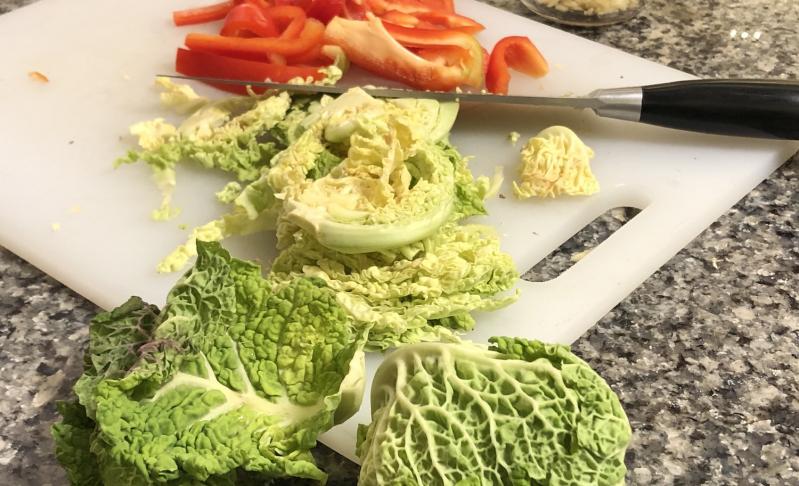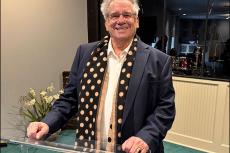A composting craze is afoot on the East End.
East Hampton Town Councilwoman Cate Rogers has a legislative “bucket list” item for 2023 that would see the creation of a pilot program to ramp up composting efforts in the town. Her vision would flip the script on the well-worn “farm-to-table” concept to a so-called table-to-farm program where residents — and eventually, restaurants — would collect food scraps that would then be composted instead of being sent off to landfills, where some 40 percent of all waste is residential food waste.
Ms. Rogers is modeling her initiative on similar successful pilot programs underway in Riverhead and Southold that have seen lots of buy-in from residents there. Those programs are “not only reducing the incredible amount of food waste that goes to landfills, but also creating a saleable item,” she said. “It’s a win-win.”
Mary Morgan created the pilot program in Southold and says she was inspired by the book “Drawdown,” which identifies 100 solutions to reverse global warming. “The number two solution is reducing and diverting food waste from landfills” she said, and composting it instead. Ms. Morgan approached the town board in Southold and told them that she would demonstrate to them that “people will want a place to bring their food scraps at the transfer station.”
Thirty families signed up, everyone got a food-scrap container, and they each took their food scraps to a designated location at Southold’s transfer station, where they were then gathered by Ms. Morgan and other volunteers and hauled to a local farm to be added to the compost.
“Everyone was delighted to participate,” she said, adding that many were shocked at how much food waste they generated, to the extent that they were now taking steps to reduce their food waste. “That, to me, is really phenomenal,” said Ms. Morgan, whose family has farmed and fished on the East End for 12 generations. “We’re not just diverting scraps but we’re getting people, without preaching, to see that they’re wasting a lot of food that is totally edible.”
Another recent composting initiative on the North Fork was focused on composting scraps generated in the back end of the restaurant Lucharitos in Mattituck, which has a few outposts on Long Island.
Brianne Briggmann, 25, is the impetus behind that program and said she was working at Lucharitos a couple of summers ago when she got the inspiration, which was embraced by the restaurant’s owner and its chef. They would throw scraps into a bucket, and Ms. Briggmann would transport them to Treiber Farms in Southold.
“I’m just so passionate about food waste,” said Ms. Briggmann. “It seems like it’s such a fixable issue and not only does it benefit the soil,” she said, but diverting food scraps from landfills can help reduce harmful methane emissions.
Ms. Briggmann says she was inspired in her effort by work undertaken by Ms. Morgan and MarkI mean, if Haubner in Riverhead — he’s the architect of the pilot program there. Mr. Haubner had a surplus of composting buckets and Ms. Briggmann grabbed half a dozen to start the program at Lucharitos. The buckets come with a so-called “gamma seal” that prevents odors from escaping.
Ms. Briggmann said she had a vision of sorts while she was establishing the kitchen-scrap composting program at the restaurant. “A circular economy is so attainable for us,” she said, noting that Lucharitos grows vegetables at a Center Moriches farm for use in its restaurant there.
Imagine, said Ms. Briggmann, if a produce driver delivered fresh vegetables to all the Lucharitos restaurants — and collected their kitchen scraps along the way for delivery back to the farm that grows the produce used in their tasty tacos.
“That’s the vision!” she said. And what’s needed now is “the right people” talking to one another.
To that end, a composting summit for the five East End towns is being planned for late January on Shelter Island, where there is now a private-public composting pilot underway with participants that include Sylvester Manor and the Mashomack Preserve.
“We’ve been working together on this stuff for four years,” said Mr. Haubner of his work with Ms. Morgan. “And one of the things we keep talking about is getting the right people in a room together.”
That means getting the various “Green Teams” from the five East End towns together — the climate-smart committees, the environmental engineers and solid-waste managers, and the “yard scrap people who are inundated with leaves and twigs,” said Mr. Haubner.
There’s no one-size-fits-all solution or program for diverting residential food waste from landfills to a composting regime: “One size fits one,” said Mr. Haubner.
East Hampton is primed for a pilot program of its own said Councilwoman Rogers — especially given the board’s focus on locating farmland for would-be growers. The town has made a priority out of finding buyable tracts of land that can then be licensed to local farmers who may have lots of good and organic ideas about farming, but not a lot of space to grow on.
The town recently selected a young couple to take over long-abandoned farmland on Cedar Street that it had purchased using community preservation funds — they’ll be growing vegetables and plan to bring in some farm animals, too. Other applicants that were passed over on the Cedar Street opportunity highlighted their existing relationships with local restaurants that create win-win opportunities of their own.
The timing couldn’t be better, said Ms. Rogers, to start a composting program here, where there is now “no ability to segregate food scraps for sorting,” she said, “so it winds up in a landfill up west.”
Mount Medford to the west — a.k.a. the Brookhaven landfill — is scheduled to close in 2024, so finding a local composting solution could also serve to reduce enhanced and anticipated garbage transporting costs to the town, said Ms. Rogers. She hopes to model the East Hampton composting program after the Southold pilot program, given some of the similarities between the respective towns.
“This will be a pilot program for households out of the gate,” she said. Restaurants could be folded in later.
Ms. Rogers also highlighted the timeliness of the broader East End composting push in light of the town’s efforts to free up farmland when and where it can. “There is a timely ongoing discussion about other ag lands that we are looking to acquire” said Ms. Rogers, noting that the Cedar Street initiative and other potential land purchases would provide some opportunities to sync the composting pilot with newly available farmland, whose soils could benefit from residential compost derived from food scraps.
But we’re getting a little ahead of ourselves here.
Scott Wilson, director of East Hampton Town’s Land Acquisition and Management Department, said in an email late last week that the Cedar Street initiative may be replicated, but he was not ready to say where.
“I think the board was very satisfied with the success of Cedar,” he wrote. “I think the interest and needs of our farming community present them with an opportunity to recreate this success. That said, I can only confirm we are looking, but not at which parcels.”




